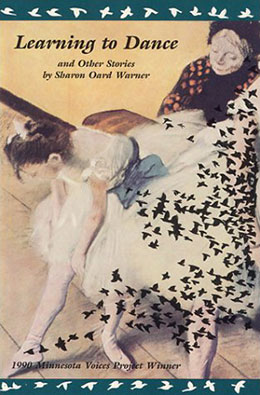Learning to Dance and Other Stories

written by Sharon Oard Warner
New Rivers Press, 1996
ISBN 978–0‑8982–3132‑8
Recognition
Minnesota Voices Project Winner 1990
Reviews
“At first, few of the women and men in Sharon Oard Warner’s debut collection seem capable of dancing. The book includes characters who are actually handicapped— women with polio and cerebral palsy, a profoundly retarded teen-age girl and, in the title story, deaf ballet students—as well as characters weighed down by the more commonplace burdens of bereavement, abandonment and divorce. All in some way lack control of their lives, and Ms. Warner’s delicately nuanced tales demonstrate their attempts to gain some measure of freedom or power. But the selections in Learning to Dance are also love stories, illustrating not the joys of physical and emotional communion but their tremendous costs: in ‘A Simple Matter of Hunger,’ for instance, a foster mother faces the pain of her attachment to a baby with AIDS. It is a tribute to Ms. Warner’s skill that none of these situations appear melodramatic or mawkish. Her moving fiction forces us to inhabit realms that are sorrowfully familiar from news reports and contemporary culture —one, ‘Christina’s World,’ is written from the viewpoint of the woman in Andrew Wyeth’s painting—but which we prefer to acknowledge from a distance. Although her precise images bring us uncomfortably close, these stories are seldom despairing. Instead, they inspire applause for Ms. Warner’s talent and for her characters’ struggles to live, to love and even to dance.” (Laurel Graeber, The New York Times Review of Books)
“Carol, the young undergraduate in ‘Birds’—a story in Warner’s first collection—takes a matron’s job at an institution for profoundly retarded girls. She meets Beth, a patient whose self-abusive practices include gouging herself with her fingernails and beating her head against walls. Carol alone discerns in Beth ‘the grace of an athlete or dancer.’ During a series of unauthorized field trips, Carol discovers that the direction of Beth’s fierce energies shift from self-multilation to an innocent wildness—a fearless letting-go that Carol has suppressed in herself. Here as elsewhere in these stories, women who are strangers to one another become co-conspirators in escape from a multitude of prisons: institutions, marriages and personal fears. Most poignant is ‘A Simple Matter of Hunger,’ detailing a young mother’s struggle to care for her adopted infant—nearly a stranger—dying of AIDS. Warner renders with genuine pathos the woman’s realization that the child, like birds in a field startled by human intrusion, will ultimately be ‘just out of my reach.’” (Publishers Weekly)
“Although her precise images bring us uncomfortably close, these stories are seldom despairing. ” ( The New York Times Book Review)
“These stories do not say: I am going to write about disabled people. They say: Some lives are hidden.” (Grace Paley, MS Magazine)
“The usual book-review jargon doesn’t capture just how good, how alive, how original are Sharon Oard Warner’s tales … ” (The Des Moines Register)

written by Sharon Oard Warner
New Rivers Press, 1996
ISBN 978–0‑8982–3132‑8
Look for this book at your favorite library or used bookseller.

